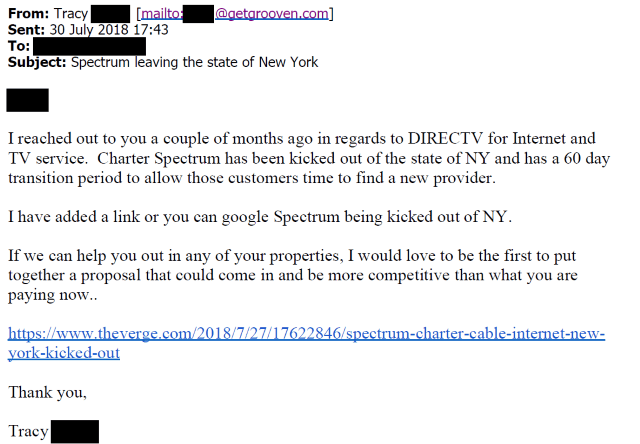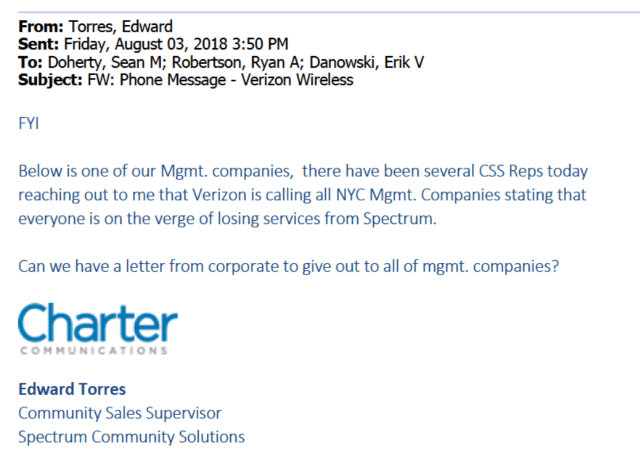 A snowstorm, in winter, in Upstate New York, was the excuse Frontier Communications gave for leaving scores of residents in the Minerva-Johnsburg area without phone or internet service for as long as 10 days this month.
A snowstorm, in winter, in Upstate New York, was the excuse Frontier Communications gave for leaving scores of residents in the Minerva-Johnsburg area without phone or internet service for as long as 10 days this month.
“We are aware of a service interruption in Minerva and have been delayed by a snowstorm that impeded access and diverted resources starting Friday,” Javier Mendoza, vice president of corporate communications and external affairs at Frontier, told The Sun.
The company routinely blames external factors for wide scale service interruptions, which often impact Frontier’s rural customers, totally reliant on aging copper wire infrastructure the company has refused to replace.
“Often [service outages] are due to uncontrollable circumstances like commercial power outages, severe weather, construction crews damaging telecom cables, cars hitting telephone poles or telecom equipment cabinets,” Mendoza said. “These causes can also delay response and restoral efforts beyond Frontier’s control.”
But customers in several states where Frontier provides the only internet access around are just as concerned by poor service that is within Frontier’s control.
Johnsburg’s town supervisor is one of them, complaining regularly about the poor quality of Frontier’s internet service, powered by DSL. It suffers frequent service outages.

Minerva-Johnsburg, N.Y.
“It’s been widespread throughout the town,” Supervisor Andrea Hogan told the newspaper. “People can’t run businesses with that.”
Those who rely on the internet to work from home are challenged by Frontier’s DSL service and frequent service problems.
Greg and Ellen Schaefer retired to the community of North River and planned to do part-time work remotely over the internet. They pay Frontier $228 a month for a package of satellite TV, landline, and internet service. On a good day, they achieve a maximum of 3 Mbps for downloads and 0.5 Mbps for uploads. But in Frontier country, where good days can be outnumbered by bad ones, the couple has often been forced into their car in search of good Wi-Fi. Some days they work from the local library, others they park by an AT&T cell tower near the base of Gore Mountain to use their car’s built-in AT&T hotspot.
Predictably, the Schaefers question the value for money they receive from Frontier Communications.
Frontier’s name conjures up the notion of a phone company providing service in the rough and rugged Old West, but Glenn Pearsall told The Sun he prefers to think of Frontier as an antique three-speed car, offering customers the choice of “dim, flickering,” or “off.”
 Pearsall pays Frontier for internet speeds advertised at 6-10+ Mbps, but receives 0.69 Mbps for downloads and 0.08 Mbps for uploads at his home in Garnet Lake. A typical Microsoft Office software update takes approximately 48 hours to arrive, assuming one of many frequent service outages does not force the upgrade to start anew.
Pearsall pays Frontier for internet speeds advertised at 6-10+ Mbps, but receives 0.69 Mbps for downloads and 0.08 Mbps for uploads at his home in Garnet Lake. A typical Microsoft Office software update takes approximately 48 hours to arrive, assuming one of many frequent service outages does not force the upgrade to start anew.
The problem for most Frontier DSL customers, especially in rural areas, is the distance between the company’s local exchange office and customers. The further away one lives, the slower the speed.
Many rural telephone exchanges have tens of thousands of feet in copper wire between the central office and an outlying customer. As a result, in the most rural areas, no internet service is available at all.
Frontier is accepting millions in Connect America Funds (CAF) — paid for by ordinary customers on their phone bill, to expand internet access into unserved areas. Frontier has to replace at least some of its copper wiring with fiber optics, which does not degrade significantly with distance. It can then reach customers part of the way over its existing copper facilities, which saves the company millions in replacement costs.
Demand for internet service and constantly rising traffic volumes suggests Frontier must regularly upgrade its equipment and backhaul connectivity. But in some areas, the company has failed to keep up with demand, resulting in online overcrowding. Customers that access the internet during peak usage times in the evenings report dramatic slowdowns and web pages that refuse to load — both symptoms of oversold network capacity.
Frontier is an integral part of New York Gov. Andrew Cuomo’s rural broadband initiative, which promises 99.9% of New Yorkers will have access to high-speed internet. The company collected $9.7 million in January 2018 to expand service to another 2,735 customers in the North Country, Southern Tier, and Finger Lakes region. The company claims it will deliver 100 Mbps internet speed to those customers in its news releases, but also warns what the company claims is never guaranteed.
“Our products state in our literature what you ‘may’ get. So it’s speeds ‘as fast as.’ You may not get 6 Mbps every moment of the day,” admitted Jan van de Carr, manager for community relations and government affairs.
It is that kind of mentality that has Pearsall keeping a bottle of champagne at the ready on the day he can disconnect Frontier service for good. But considering the alternative is likely to be satellite internet offered by Hughes, that bottle is likely to remain corked for a long time into the future.


 Subscribe
Subscribe




 Charter Communications ‘productive negotiations’ with New York’s Public Service Commission have deteriorated.
Charter Communications ‘productive negotiations’ with New York’s Public Service Commission have deteriorated. Charter argues the Commission has no right to insist on much of anything, because much of its business operation is unregulated and attempts to interfere with it would cause the company “clear and substantial irreparable harm,” and violate the company’s constitutional rights.
Charter argues the Commission has no right to insist on much of anything, because much of its business operation is unregulated and attempts to interfere with it would cause the company “clear and substantial irreparable harm,” and violate the company’s constitutional rights. Charter claims the Commission changed the terms of the Merger Order after it was approved. In Charter’s view, the company’s expansion effort to reach unserved parts of New York State should include New York City, one of the most wired metropolitan areas in the United States. That the Commission took offense to Charter’s interpretation of the Merger Order should not mean the company should face the ultimate consequence — being asked to leave the state.
Charter claims the Commission changed the terms of the Merger Order after it was approved. In Charter’s view, the company’s expansion effort to reach unserved parts of New York State should include New York City, one of the most wired metropolitan areas in the United States. That the Commission took offense to Charter’s interpretation of the Merger Order should not mean the company should face the ultimate consequence — being asked to leave the state. Charter expects the PSC to rule on its motion within a week of filing it, demanding a stay before the start of business on Monday, Nov. 26. If the company does not get what it wants, it will seek a stay from the Supreme Court in Albany County instead.
Charter expects the PSC to rule on its motion within a week of filing it, demanding a stay before the start of business on Monday, Nov. 26. If the company does not get what it wants, it will seek a stay from the Supreme Court in Albany County instead.